Unit 7 Business Law Report: Sources of Law and Government Role
VerifiedAdded on 2021/06/14
|19
|6056
|100
Report
AI Summary
This report, prepared for a Business Law unit, provides a comprehensive overview of the UK legal system. It begins with an introduction to the definition, function, and role of law and the government. The report explores the different sources of law, specifically differentiating between case law (common law) and statutory law. It further distinguishes between civil and criminal law. The role of the government in law-making is explained, including the function of Parliament and the process of creating statutory law. The structure of the UK court system is presented. The report includes an analysis of how UK judges apply law in resolving legal suits using a chosen case study, summarizing the facts, identifying legal issues, listing court decisions, and clarifying the applied law. The report also includes an analysis of the development and recent reforms of the UK legal system, and concludes with a summary of key findings. The report follows the guidelines of the assignment brief, including the required structure and referencing style.
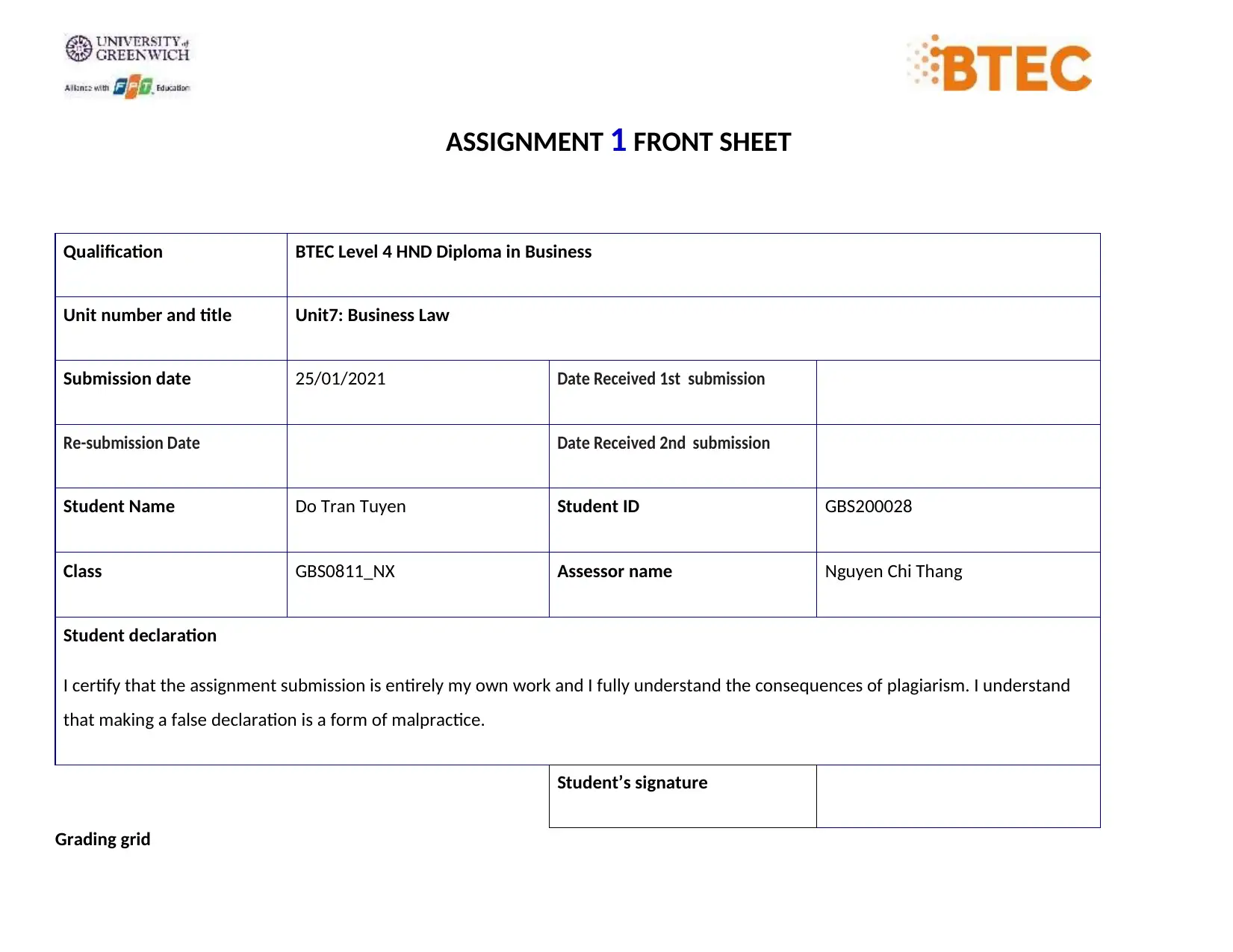
ASSIGNMENT 1 FRONT SHEET
Qualification BTEC Level 4 HND Diploma in Business
Unit number and title Unit7: Business Law
Submission date 25/01/2021 Date Received 1st submission
Re-submission Date Date Received 2nd submission
Student Name Do Tran Tuyen Student ID GBS200028
Class GBS0811_NX Assessor name Nguyen Chi Thang
Student declaration
I certify that the assignment submission is entirely my own work and I fully understand the consequences of plagiarism. I understand
that making a false declaration is a form of malpractice.
Student’s signature
Grading grid
Qualification BTEC Level 4 HND Diploma in Business
Unit number and title Unit7: Business Law
Submission date 25/01/2021 Date Received 1st submission
Re-submission Date Date Received 2nd submission
Student Name Do Tran Tuyen Student ID GBS200028
Class GBS0811_NX Assessor name Nguyen Chi Thang
Student declaration
I certify that the assignment submission is entirely my own work and I fully understand the consequences of plagiarism. I understand
that making a false declaration is a form of malpractice.
Student’s signature
Grading grid
Paraphrase This Document
Need a fresh take? Get an instant paraphrase of this document with our AI Paraphraser
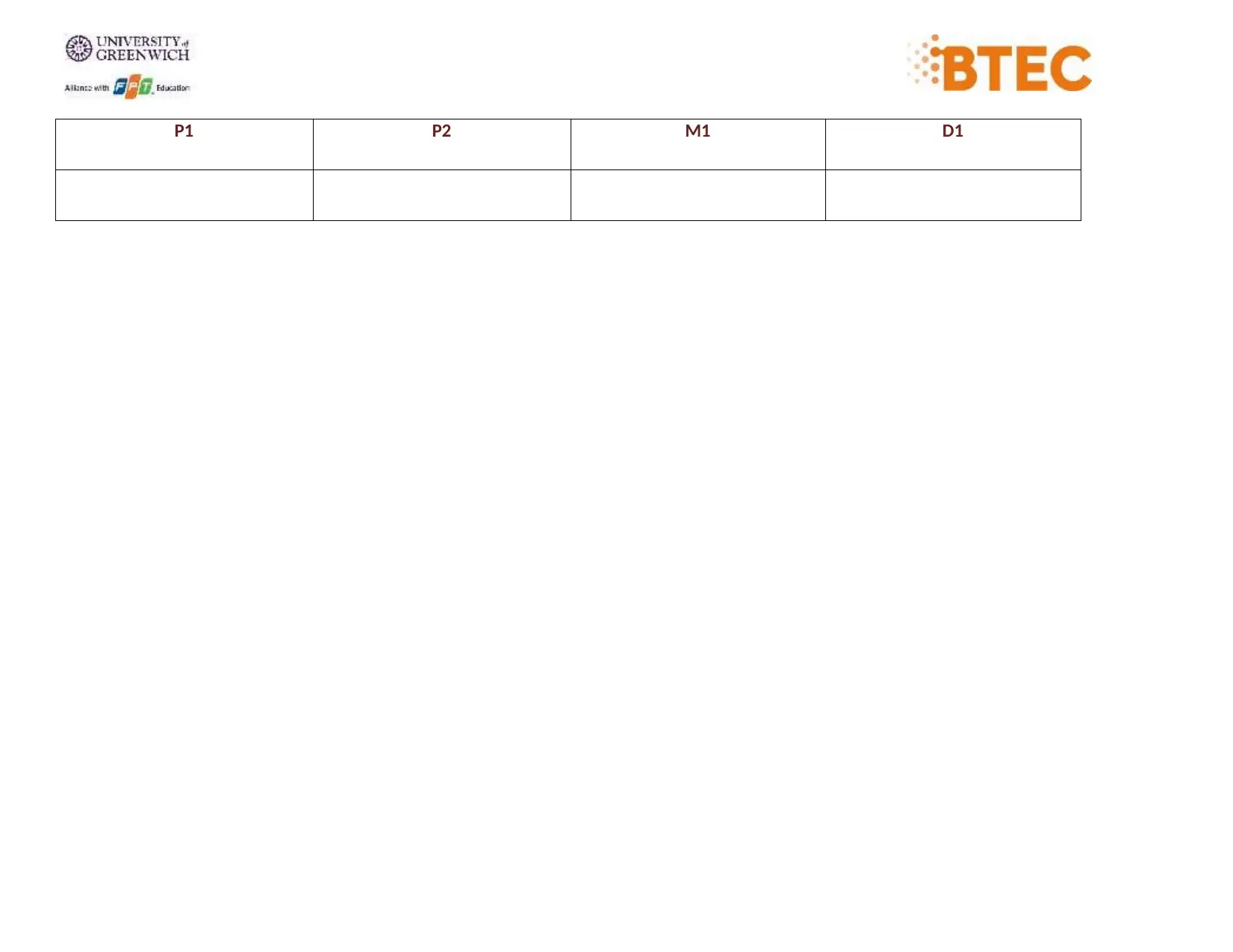
P1 P2 M1 D1
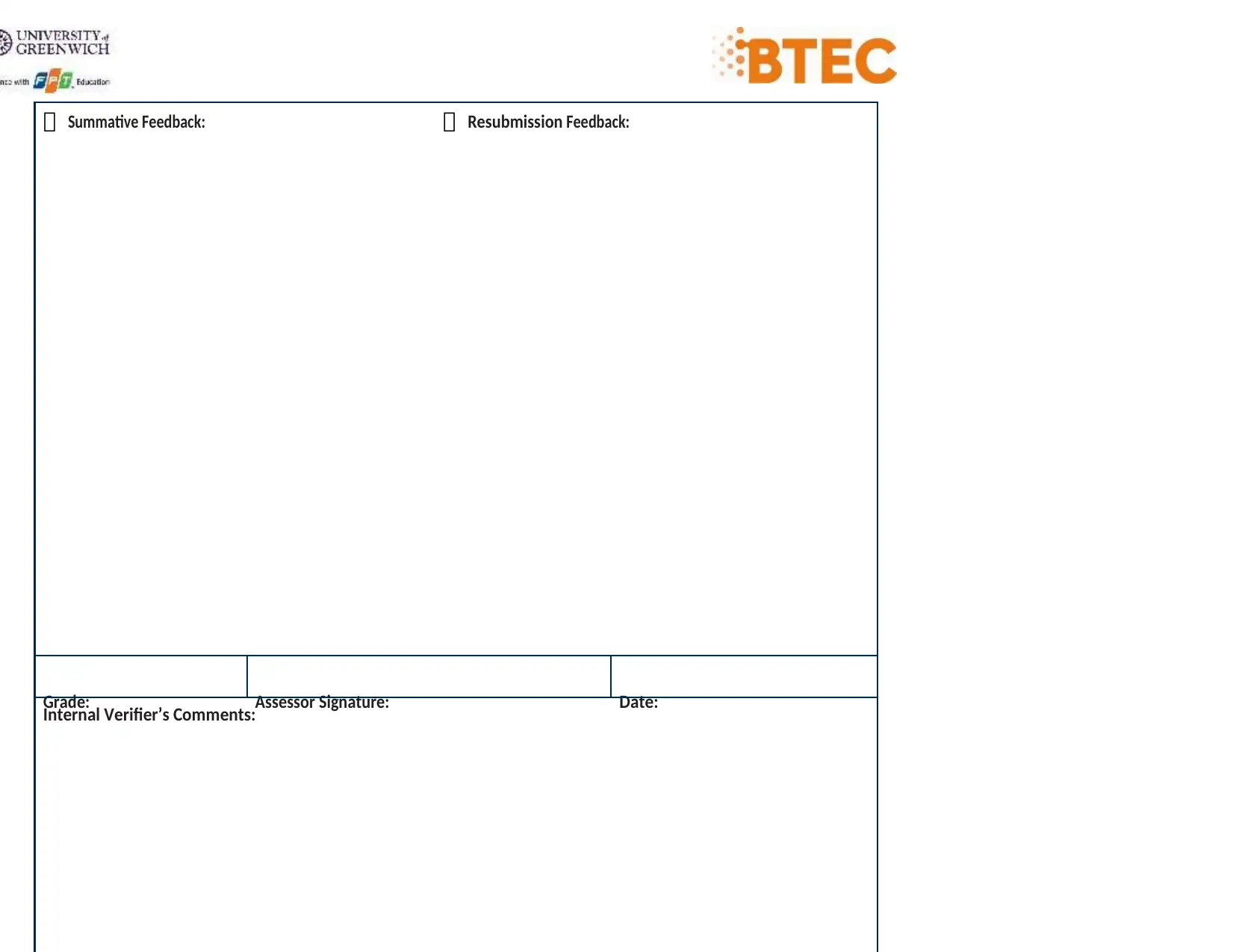
Summative Feedback: Resubmission Feedback:
Grade: Assessor Signature: Date:
Internal Verifier’s Comments:
Grade: Assessor Signature: Date:
Internal Verifier’s Comments:
⊘ This is a preview!⊘
Do you want full access?
Subscribe today to unlock all pages.

Trusted by 1+ million students worldwide
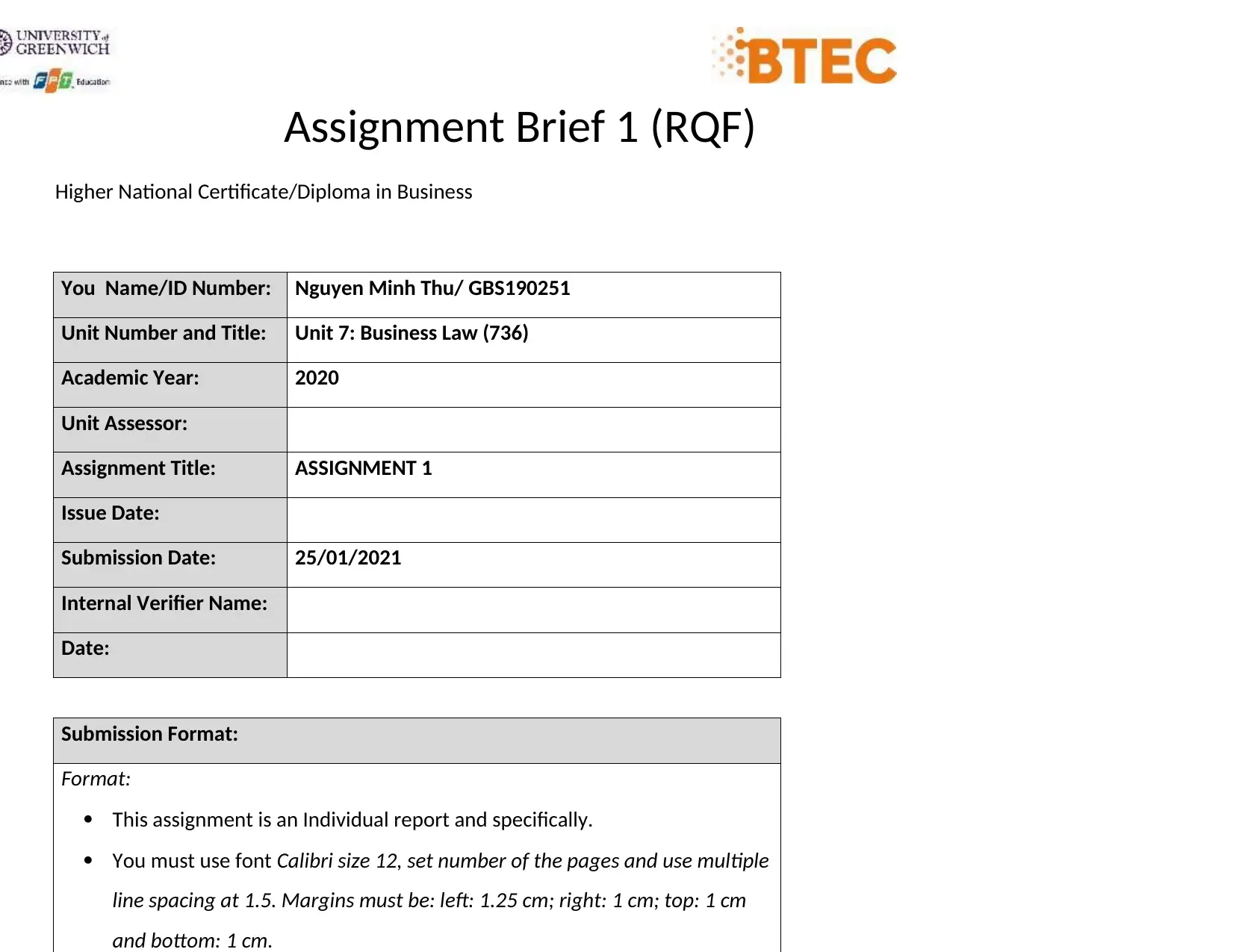
Assignment Brief 1 (RQF)
Higher National Certificate/Diploma in Business
You Name/ID Number: Nguyen Minh Thu/ GBS190251
Unit Number and Title: Unit 7: Business Law (736)
Academic Year: 2020
Unit Assessor:
Assignment Title: ASSIGNMENT 1
Issue Date:
Submission Date: 25/01/2021
Internal Verifier Name:
Date:
Submission Format:
Format:
This assignment is an Individual report and specifically.
You must use font Calibri size 12, set number of the pages and use multiple
line spacing at 1.5. Margins must be: left: 1.25 cm; right: 1 cm; top: 1 cm
and bottom: 1 cm.
Higher National Certificate/Diploma in Business
You Name/ID Number: Nguyen Minh Thu/ GBS190251
Unit Number and Title: Unit 7: Business Law (736)
Academic Year: 2020
Unit Assessor:
Assignment Title: ASSIGNMENT 1
Issue Date:
Submission Date: 25/01/2021
Internal Verifier Name:
Date:
Submission Format:
Format:
This assignment is an Individual report and specifically.
You must use font Calibri size 12, set number of the pages and use multiple
line spacing at 1.5. Margins must be: left: 1.25 cm; right: 1 cm; top: 1 cm
and bottom: 1 cm.
Paraphrase This Document
Need a fresh take? Get an instant paraphrase of this document with our AI Paraphraser
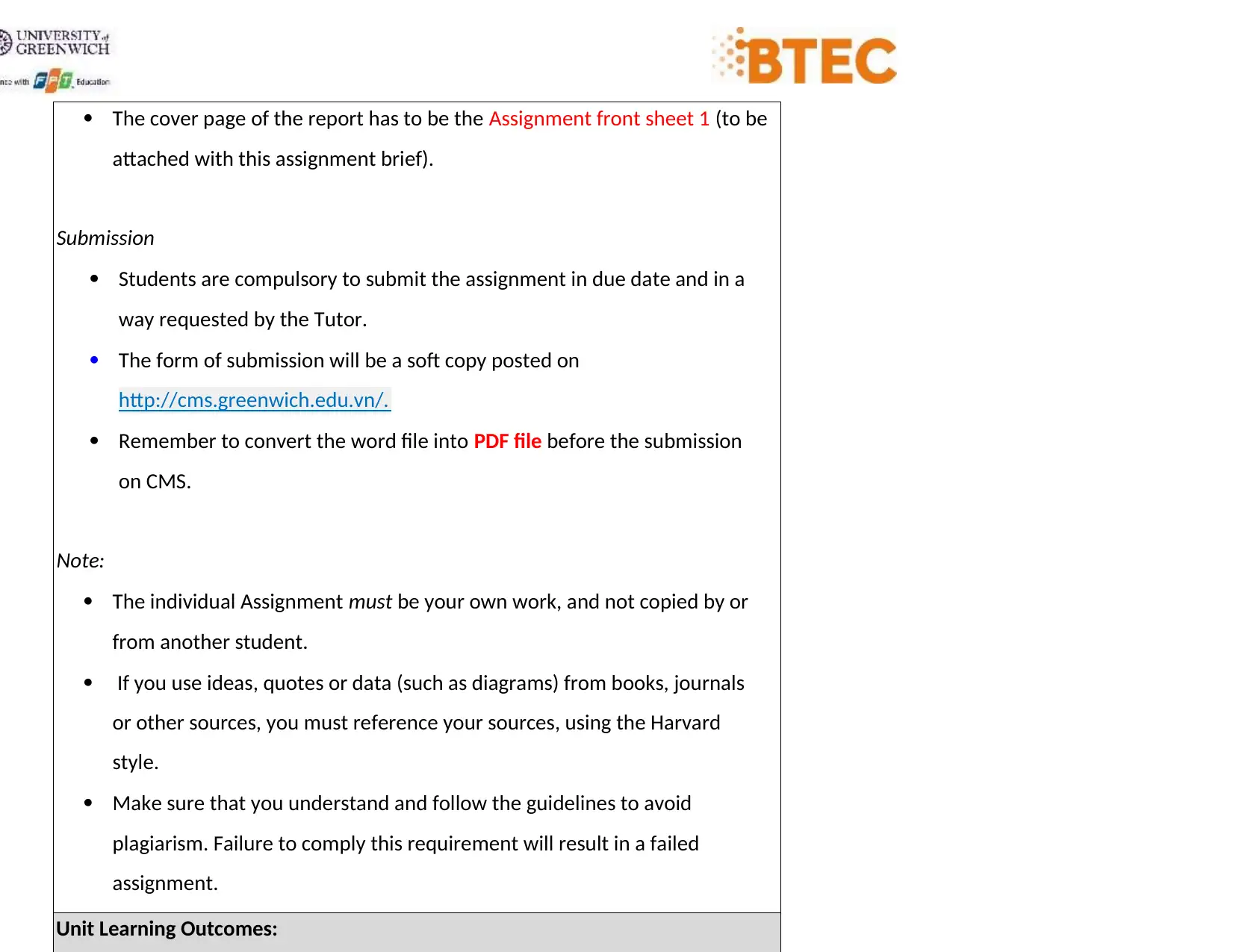
The cover page of the report has to be the Assignment front sheet 1 (to be
attached with this assignment brief).
Submission
Students are compulsory to submit the assignment in due date and in a
way requested by the Tutor.
The form of submission will be a soft copy posted on
http://cms.greenwich.edu.vn/.
Remember to convert the word file into PDF file before the submission
on CMS.
Note:
The individual Assignment must be your own work, and not copied by or
from another student.
If you use ideas, quotes or data (such as diagrams) from books, journals
or other sources, you must reference your sources, using the Harvard
style.
Make sure that you understand and follow the guidelines to avoid
plagiarism. Failure to comply this requirement will result in a failed
assignment.
Unit Learning Outcomes:
attached with this assignment brief).
Submission
Students are compulsory to submit the assignment in due date and in a
way requested by the Tutor.
The form of submission will be a soft copy posted on
http://cms.greenwich.edu.vn/.
Remember to convert the word file into PDF file before the submission
on CMS.
Note:
The individual Assignment must be your own work, and not copied by or
from another student.
If you use ideas, quotes or data (such as diagrams) from books, journals
or other sources, you must reference your sources, using the Harvard
style.
Make sure that you understand and follow the guidelines to avoid
plagiarism. Failure to comply this requirement will result in a failed
assignment.
Unit Learning Outcomes:
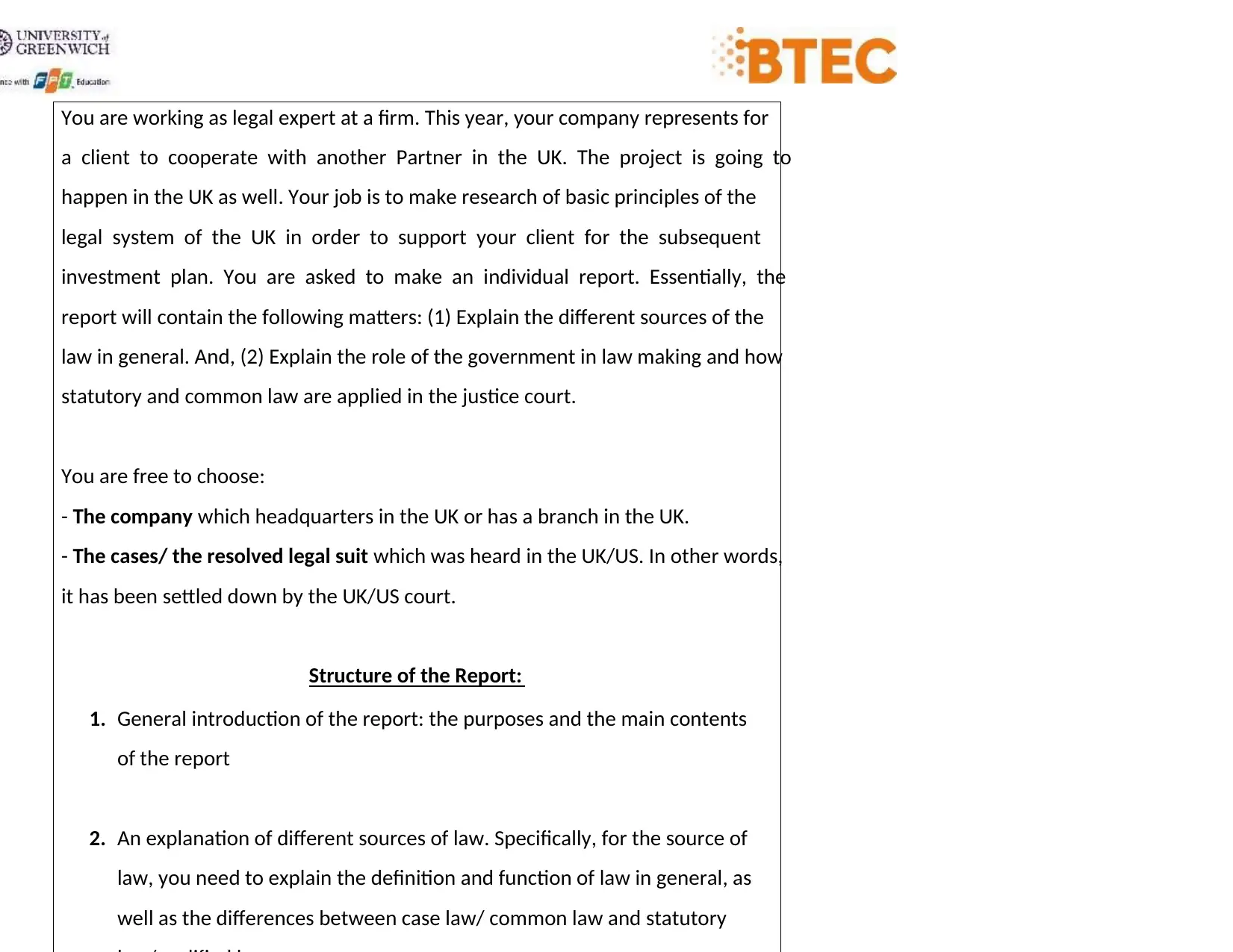
You are working as legal expert at a firm. This year, your company represents for
a client to cooperate with another Partner in the UK. The project is going to
happen in the UK as well. Your job is to make research of basic principles of the
legal system of the UK in order to support your client for the subsequent
investment plan. You are asked to make an individual report. Essentially, the
report will contain the following matters: (1) Explain the different sources of the
law in general. And, (2) Explain the role of the government in law making and how
statutory and common law are applied in the justice court.
You are free to choose:
- The company which headquarters in the UK or has a branch in the UK.
- The cases/ the resolved legal suit which was heard in the UK/US. In other words,
it has been settled down by the UK/US court.
Structure of the Report:
1. General introduction of the report: the purposes and the main contents
of the report
2. An explanation of different sources of law. Specifically, for the source of
law, you need to explain the definition and function of law in general, as
well as the differences between case law/ common law and statutory
a client to cooperate with another Partner in the UK. The project is going to
happen in the UK as well. Your job is to make research of basic principles of the
legal system of the UK in order to support your client for the subsequent
investment plan. You are asked to make an individual report. Essentially, the
report will contain the following matters: (1) Explain the different sources of the
law in general. And, (2) Explain the role of the government in law making and how
statutory and common law are applied in the justice court.
You are free to choose:
- The company which headquarters in the UK or has a branch in the UK.
- The cases/ the resolved legal suit which was heard in the UK/US. In other words,
it has been settled down by the UK/US court.
Structure of the Report:
1. General introduction of the report: the purposes and the main contents
of the report
2. An explanation of different sources of law. Specifically, for the source of
law, you need to explain the definition and function of law in general, as
well as the differences between case law/ common law and statutory
⊘ This is a preview!⊘
Do you want full access?
Subscribe today to unlock all pages.

Trusted by 1+ million students worldwide
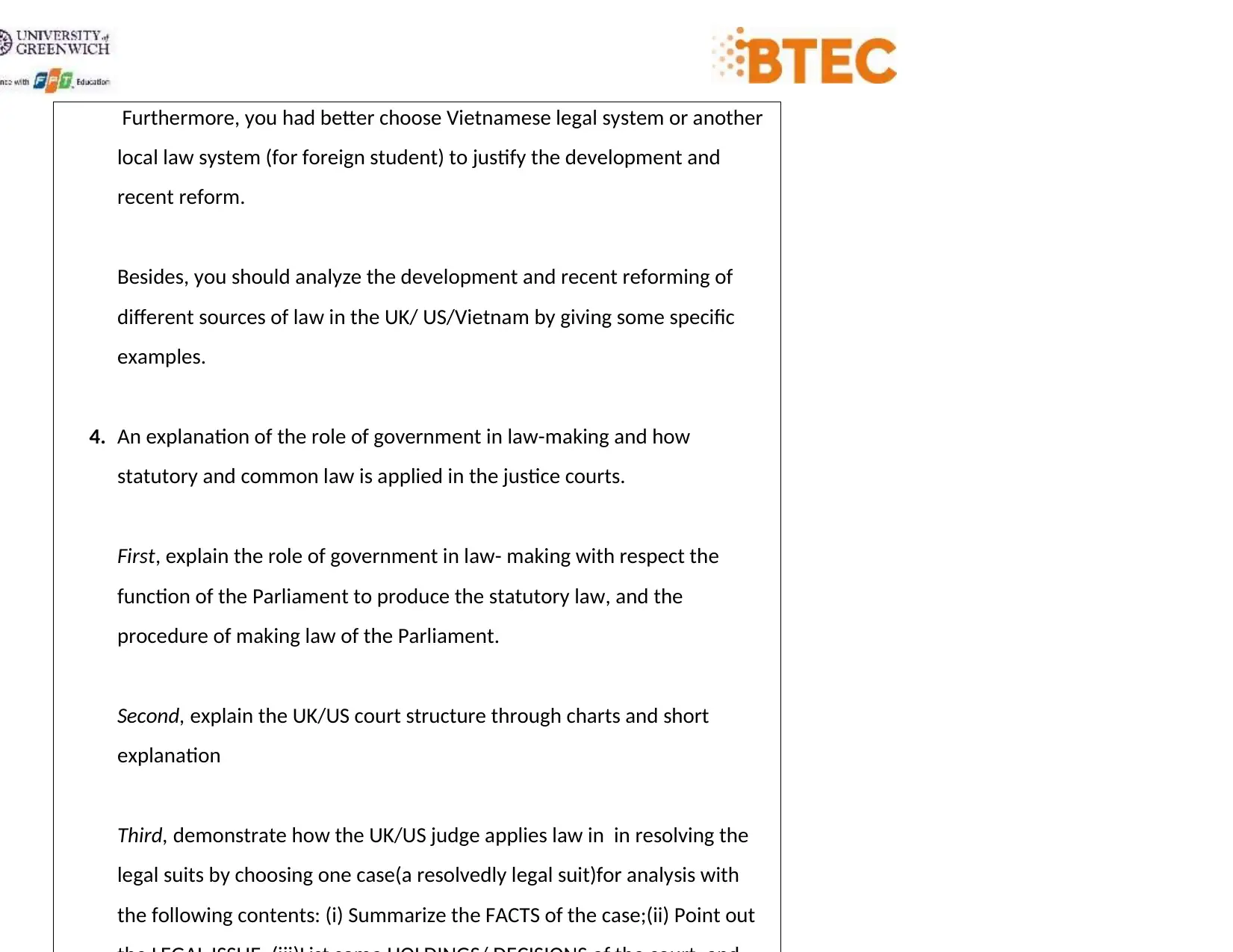
Furthermore, you had better choose Vietnamese legal system or another
local law system (for foreign student) to justify the development and
recent reform.
Besides, you should analyze the development and recent reforming of
different sources of law in the UK/ US/Vietnam by giving some specific
examples.
4. An explanation of the role of government in law-making and how
statutory and common law is applied in the justice courts.
First, explain the role of government in law- making with respect the
function of the Parliament to produce the statutory law, and the
procedure of making law of the Parliament.
Second, explain the UK/US court structure through charts and short
explanation
Third, demonstrate how the UK/US judge applies law in in resolving the
legal suits by choosing one case(a resolvedly legal suit)for analysis with
the following contents: (i) Summarize the FACTS of the case;(ii) Point out
local law system (for foreign student) to justify the development and
recent reform.
Besides, you should analyze the development and recent reforming of
different sources of law in the UK/ US/Vietnam by giving some specific
examples.
4. An explanation of the role of government in law-making and how
statutory and common law is applied in the justice courts.
First, explain the role of government in law- making with respect the
function of the Parliament to produce the statutory law, and the
procedure of making law of the Parliament.
Second, explain the UK/US court structure through charts and short
explanation
Third, demonstrate how the UK/US judge applies law in in resolving the
legal suits by choosing one case(a resolvedly legal suit)for analysis with
the following contents: (i) Summarize the FACTS of the case;(ii) Point out
Paraphrase This Document
Need a fresh take? Get an instant paraphrase of this document with our AI Paraphraser
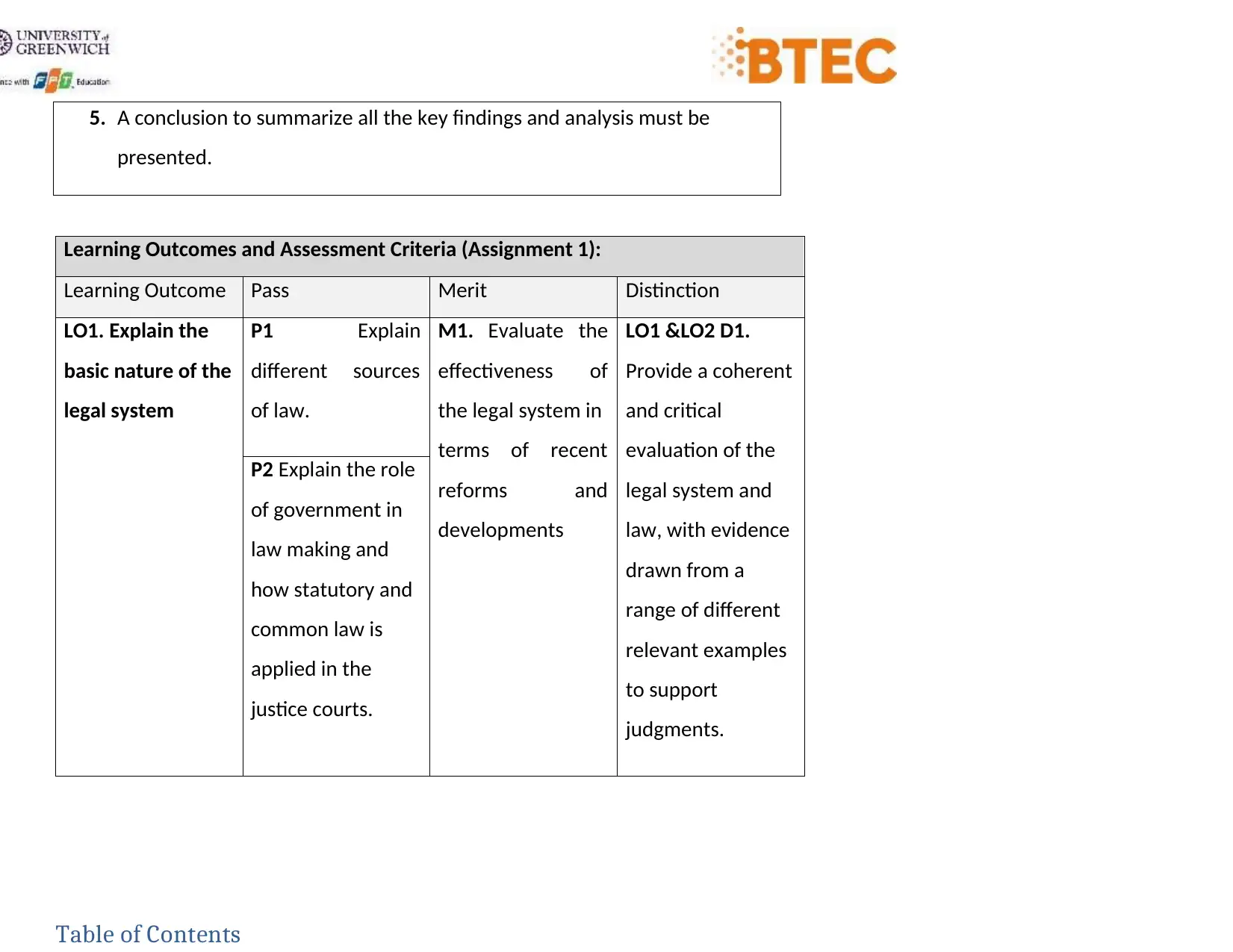
5. A conclusion to summarize all the key findings and analysis must be
presented.
Learning Outcomes and Assessment Criteria (Assignment 1):
Learning Outcome Pass Merit Distinction
LO1. Explain the
basic nature of the
legal system
P1 Explain
different sources
of law.
M1. Evaluate the
effectiveness of
the legal system in
terms of recent
reforms and
developments
LO1 &LO2 D1.
Provide a coherent
and critical
evaluation of the
legal system and
law, with evidence
drawn from a
range of different
relevant examples
to support
judgments.
P2 Explain the role
of government in
law making and
how statutory and
common law is
applied in the
justice courts.
Table of Contents
presented.
Learning Outcomes and Assessment Criteria (Assignment 1):
Learning Outcome Pass Merit Distinction
LO1. Explain the
basic nature of the
legal system
P1 Explain
different sources
of law.
M1. Evaluate the
effectiveness of
the legal system in
terms of recent
reforms and
developments
LO1 &LO2 D1.
Provide a coherent
and critical
evaluation of the
legal system and
law, with evidence
drawn from a
range of different
relevant examples
to support
judgments.
P2 Explain the role
of government in
law making and
how statutory and
common law is
applied in the
justice courts.
Table of Contents
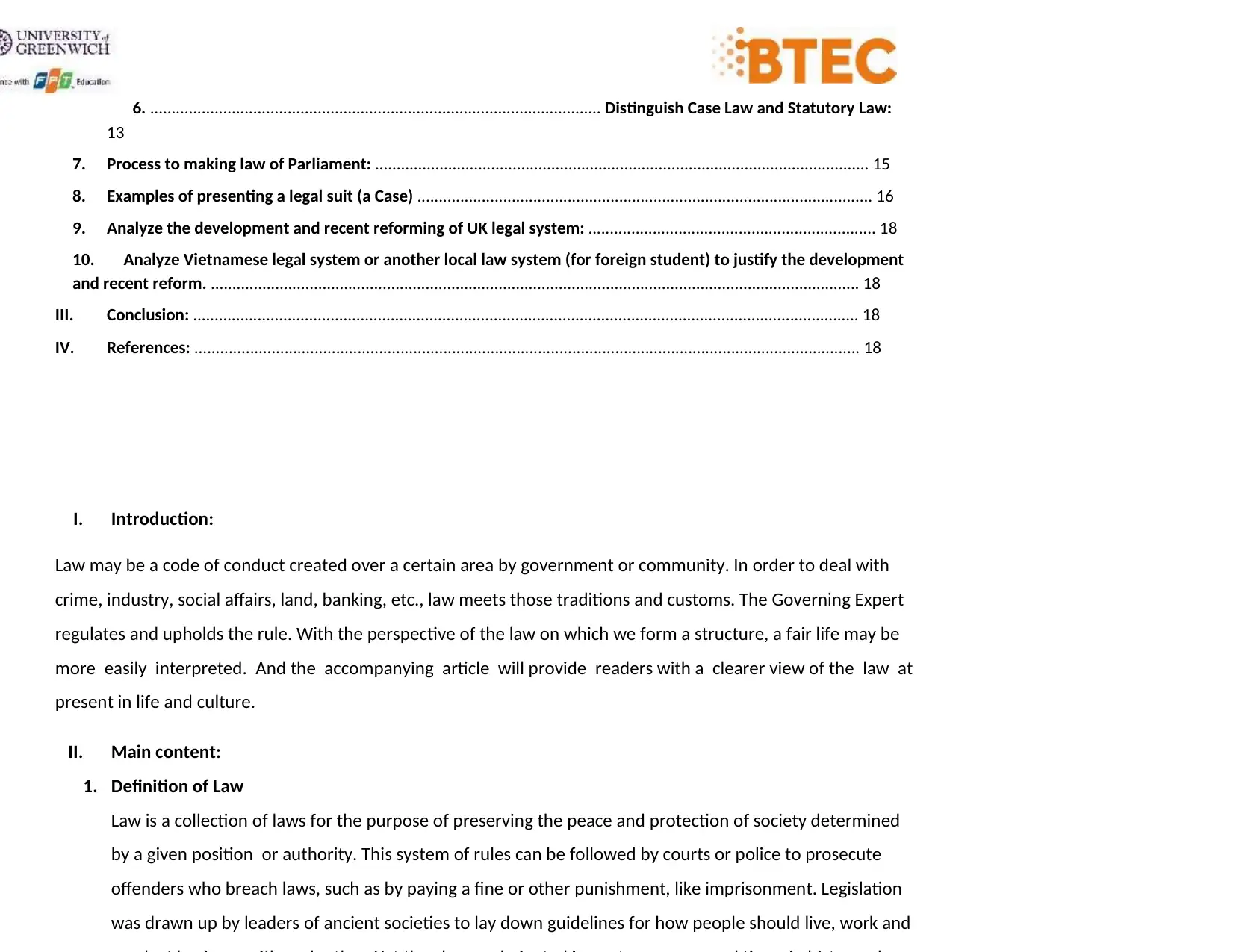
6. ......................................................................................................... Distinguish Case Law and Statutory Law:
13
7. Process to making law of Parliament: ................................................................................................................... 15
8. Examples of presenting a legal suit (a Case) .......................................................................................................... 16
9. Analyze the development and recent reforming of UK legal system: ................................................................... 18
10. Analyze Vietnamese legal system or another local law system (for foreign student) to justify the development
and recent reform. ....................................................................................................................................................... 18
III. Conclusion: ........................................................................................................................................................... 18
IV. References: ........................................................................................................................................................... 18
I. Introduction:
Law may be a code of conduct created over a certain area by government or community. In order to deal with
crime, industry, social affairs, land, banking, etc., law meets those traditions and customs. The Governing Expert
regulates and upholds the rule. With the perspective of the law on which we form a structure, a fair life may be
more easily interpreted. And the accompanying article will provide readers with a clearer view of the law at
present in life and culture.
II. Main content:
1. Definition of Law
Law is a collection of laws for the purpose of preserving the peace and protection of society determined
by a given position or authority. This system of rules can be followed by courts or police to prosecute
offenders who breach laws, such as by paying a fine or other punishment, like imprisonment. Legislation
was drawn up by leaders of ancient societies to lay down guidelines for how people should live, work and
13
7. Process to making law of Parliament: ................................................................................................................... 15
8. Examples of presenting a legal suit (a Case) .......................................................................................................... 16
9. Analyze the development and recent reforming of UK legal system: ................................................................... 18
10. Analyze Vietnamese legal system or another local law system (for foreign student) to justify the development
and recent reform. ....................................................................................................................................................... 18
III. Conclusion: ........................................................................................................................................................... 18
IV. References: ........................................................................................................................................................... 18
I. Introduction:
Law may be a code of conduct created over a certain area by government or community. In order to deal with
crime, industry, social affairs, land, banking, etc., law meets those traditions and customs. The Governing Expert
regulates and upholds the rule. With the perspective of the law on which we form a structure, a fair life may be
more easily interpreted. And the accompanying article will provide readers with a clearer view of the law at
present in life and culture.
II. Main content:
1. Definition of Law
Law is a collection of laws for the purpose of preserving the peace and protection of society determined
by a given position or authority. This system of rules can be followed by courts or police to prosecute
offenders who breach laws, such as by paying a fine or other punishment, like imprisonment. Legislation
was drawn up by leaders of ancient societies to lay down guidelines for how people should live, work and
⊘ This is a preview!⊘
Do you want full access?
Subscribe today to unlock all pages.

Trusted by 1+ million students worldwide
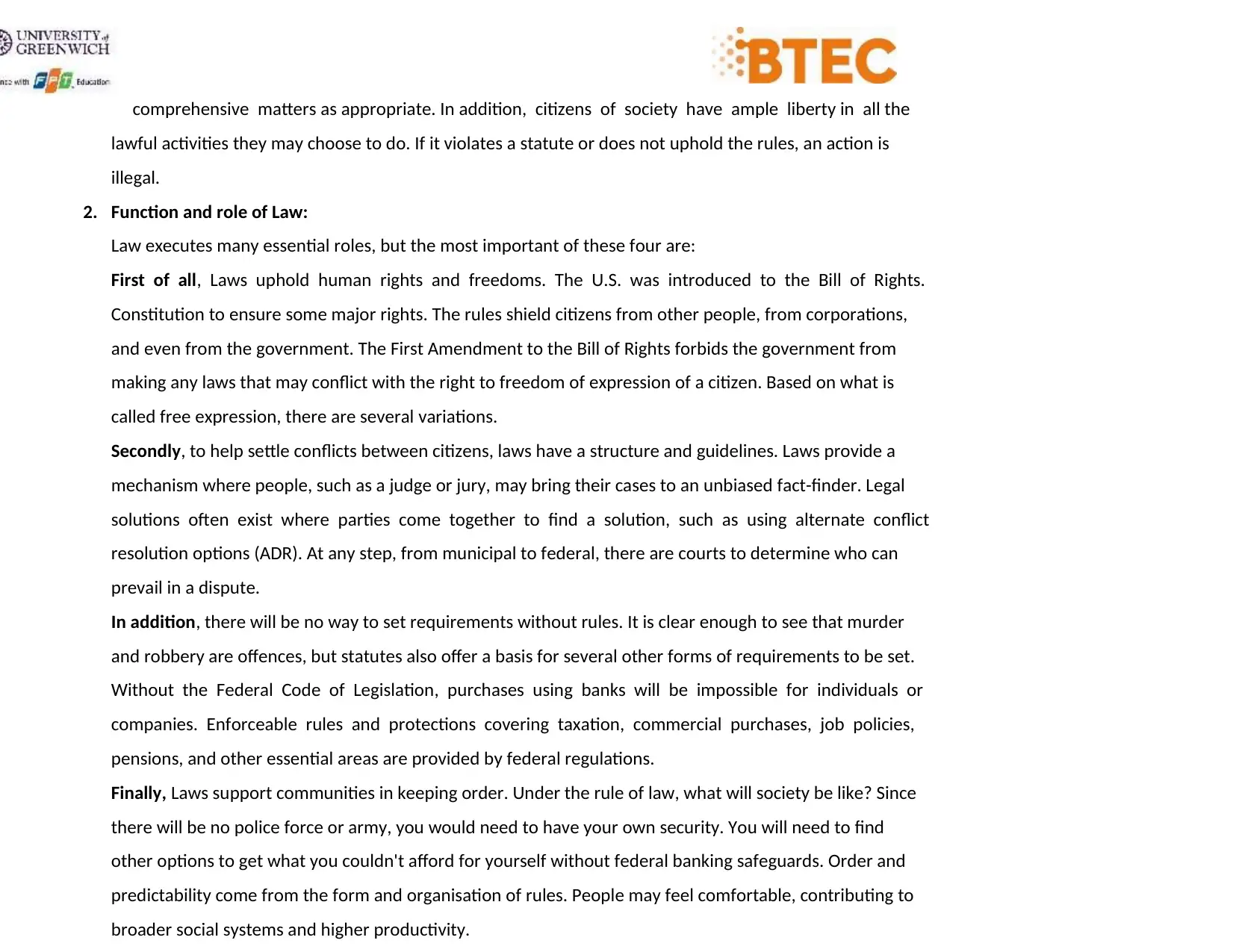
comprehensive matters as appropriate. In addition, citizens of society have ample liberty in all the
lawful activities they may choose to do. If it violates a statute or does not uphold the rules, an action is
illegal.
2. Function and role of Law:
Law executes many essential roles, but the most important of these four are:
First of all, Laws uphold human rights and freedoms. The U.S. was introduced to the Bill of Rights.
Constitution to ensure some major rights. The rules shield citizens from other people, from corporations,
and even from the government. The First Amendment to the Bill of Rights forbids the government from
making any laws that may conflict with the right to freedom of expression of a citizen. Based on what is
called free expression, there are several variations.
Secondly, to help settle conflicts between citizens, laws have a structure and guidelines. Laws provide a
mechanism where people, such as a judge or jury, may bring their cases to an unbiased fact-finder. Legal
solutions often exist where parties come together to find a solution, such as using alternate conflict
resolution options (ADR). At any step, from municipal to federal, there are courts to determine who can
prevail in a dispute.
In addition, there will be no way to set requirements without rules. It is clear enough to see that murder
and robbery are offences, but statutes also offer a basis for several other forms of requirements to be set.
Without the Federal Code of Legislation, purchases using banks will be impossible for individuals or
companies. Enforceable rules and protections covering taxation, commercial purchases, job policies,
pensions, and other essential areas are provided by federal regulations.
Finally, Laws support communities in keeping order. Under the rule of law, what will society be like? Since
there will be no police force or army, you would need to have your own security. You will need to find
other options to get what you couldn't afford for yourself without federal banking safeguards. Order and
predictability come from the form and organisation of rules. People may feel comfortable, contributing to
broader social systems and higher productivity.
lawful activities they may choose to do. If it violates a statute or does not uphold the rules, an action is
illegal.
2. Function and role of Law:
Law executes many essential roles, but the most important of these four are:
First of all, Laws uphold human rights and freedoms. The U.S. was introduced to the Bill of Rights.
Constitution to ensure some major rights. The rules shield citizens from other people, from corporations,
and even from the government. The First Amendment to the Bill of Rights forbids the government from
making any laws that may conflict with the right to freedom of expression of a citizen. Based on what is
called free expression, there are several variations.
Secondly, to help settle conflicts between citizens, laws have a structure and guidelines. Laws provide a
mechanism where people, such as a judge or jury, may bring their cases to an unbiased fact-finder. Legal
solutions often exist where parties come together to find a solution, such as using alternate conflict
resolution options (ADR). At any step, from municipal to federal, there are courts to determine who can
prevail in a dispute.
In addition, there will be no way to set requirements without rules. It is clear enough to see that murder
and robbery are offences, but statutes also offer a basis for several other forms of requirements to be set.
Without the Federal Code of Legislation, purchases using banks will be impossible for individuals or
companies. Enforceable rules and protections covering taxation, commercial purchases, job policies,
pensions, and other essential areas are provided by federal regulations.
Finally, Laws support communities in keeping order. Under the rule of law, what will society be like? Since
there will be no police force or army, you would need to have your own security. You will need to find
other options to get what you couldn't afford for yourself without federal banking safeguards. Order and
predictability come from the form and organisation of rules. People may feel comfortable, contributing to
broader social systems and higher productivity.
Paraphrase This Document
Need a fresh take? Get an instant paraphrase of this document with our AI Paraphraser
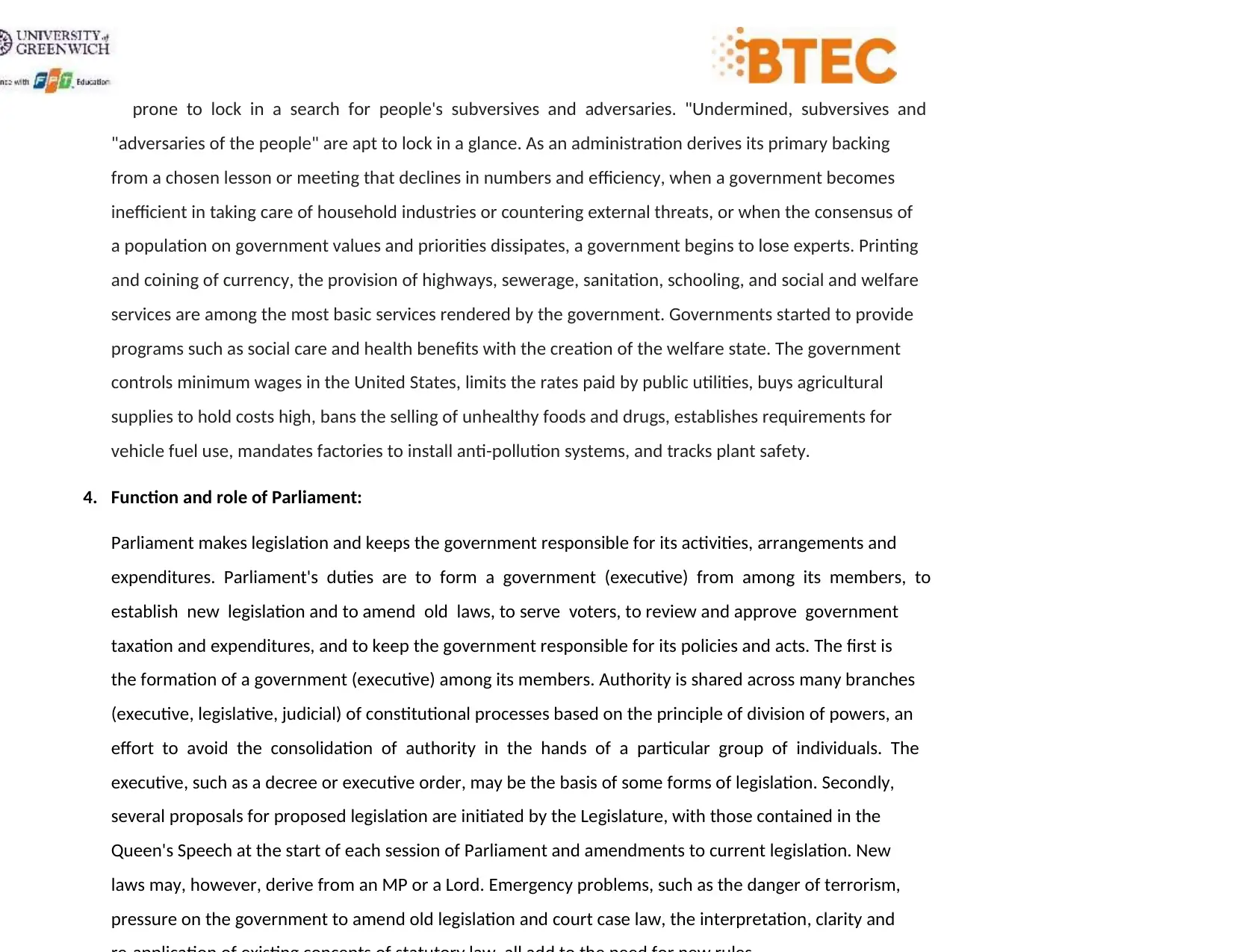
prone to lock in a search for people's subversives and adversaries. "Undermined, subversives and
"adversaries of the people" are apt to lock in a glance. As an administration derives its primary backing
from a chosen lesson or meeting that declines in numbers and efficiency, when a government becomes
inefficient in taking care of household industries or countering external threats, or when the consensus of
a population on government values and priorities dissipates, a government begins to lose experts. Printing
and coining of currency, the provision of highways, sewerage, sanitation, schooling, and social and welfare
services are among the most basic services rendered by the government. Governments started to provide
programs such as social care and health benefits with the creation of the welfare state. The government
controls minimum wages in the United States, limits the rates paid by public utilities, buys agricultural
supplies to hold costs high, bans the selling of unhealthy foods and drugs, establishes requirements for
vehicle fuel use, mandates factories to install anti-pollution systems, and tracks plant safety.
4. Function and role of Parliament:
Parliament makes legislation and keeps the government responsible for its activities, arrangements and
expenditures. Parliament's duties are to form a government (executive) from among its members, to
establish new legislation and to amend old laws, to serve voters, to review and approve government
taxation and expenditures, and to keep the government responsible for its policies and acts. The first is
the formation of a government (executive) among its members. Authority is shared across many branches
(executive, legislative, judicial) of constitutional processes based on the principle of division of powers, an
effort to avoid the consolidation of authority in the hands of a particular group of individuals. The
executive, such as a decree or executive order, may be the basis of some forms of legislation. Secondly,
several proposals for proposed legislation are initiated by the Legislature, with those contained in the
Queen's Speech at the start of each session of Parliament and amendments to current legislation. New
laws may, however, derive from an MP or a Lord. Emergency problems, such as the danger of terrorism,
pressure on the government to amend old legislation and court case law, the interpretation, clarity and
"adversaries of the people" are apt to lock in a glance. As an administration derives its primary backing
from a chosen lesson or meeting that declines in numbers and efficiency, when a government becomes
inefficient in taking care of household industries or countering external threats, or when the consensus of
a population on government values and priorities dissipates, a government begins to lose experts. Printing
and coining of currency, the provision of highways, sewerage, sanitation, schooling, and social and welfare
services are among the most basic services rendered by the government. Governments started to provide
programs such as social care and health benefits with the creation of the welfare state. The government
controls minimum wages in the United States, limits the rates paid by public utilities, buys agricultural
supplies to hold costs high, bans the selling of unhealthy foods and drugs, establishes requirements for
vehicle fuel use, mandates factories to install anti-pollution systems, and tracks plant safety.
4. Function and role of Parliament:
Parliament makes legislation and keeps the government responsible for its activities, arrangements and
expenditures. Parliament's duties are to form a government (executive) from among its members, to
establish new legislation and to amend old laws, to serve voters, to review and approve government
taxation and expenditures, and to keep the government responsible for its policies and acts. The first is
the formation of a government (executive) among its members. Authority is shared across many branches
(executive, legislative, judicial) of constitutional processes based on the principle of division of powers, an
effort to avoid the consolidation of authority in the hands of a particular group of individuals. The
executive, such as a decree or executive order, may be the basis of some forms of legislation. Secondly,
several proposals for proposed legislation are initiated by the Legislature, with those contained in the
Queen's Speech at the start of each session of Parliament and amendments to current legislation. New
laws may, however, derive from an MP or a Lord. Emergency problems, such as the danger of terrorism,
pressure on the government to amend old legislation and court case law, the interpretation, clarity and
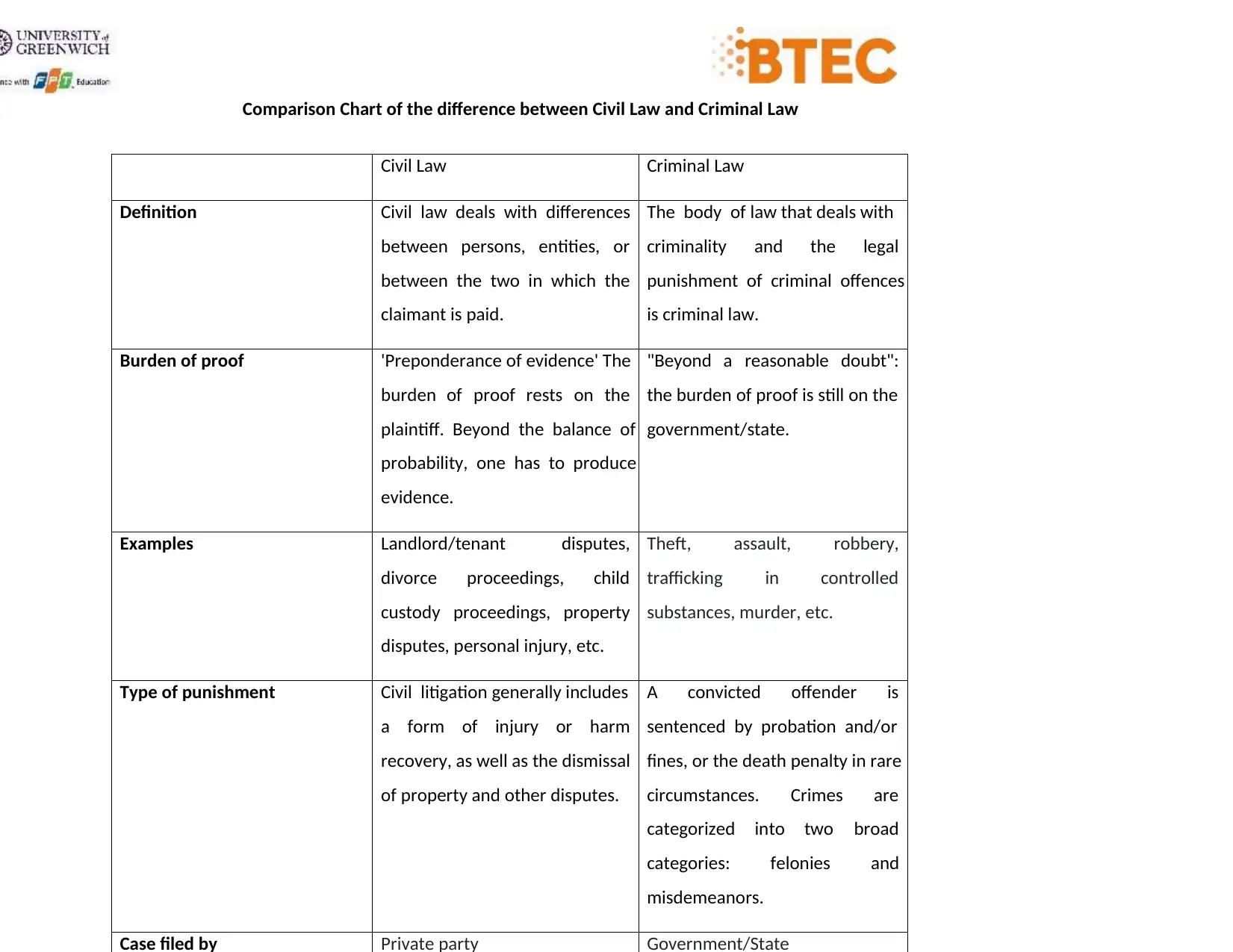
Comparison Chart of the difference between Civil Law and Criminal Law
Civil Law Criminal Law
Definition Civil law deals with differences
between persons, entities, or
between the two in which the
claimant is paid.
The body of law that deals with
criminality and the legal
punishment of criminal offences
is criminal law.
Burden of proof 'Preponderance of evidence' The
burden of proof rests on the
plaintiff. Beyond the balance of
probability, one has to produce
evidence.
"Beyond a reasonable doubt":
the burden of proof is still on the
government/state.
Examples Landlord/tenant disputes,
divorce proceedings, child
custody proceedings, property
disputes, personal injury, etc.
Theft, assault, robbery,
trafficking in controlled
substances, murder, etc.
Type of punishment Civil litigation generally includes
a form of injury or harm
recovery, as well as the dismissal
of property and other disputes.
A convicted offender is
sentenced by probation and/or
fines, or the death penalty in rare
circumstances. Crimes are
categorized into two broad
categories: felonies and
misdemeanors.
Case filed by Private party Government/State
Civil Law Criminal Law
Definition Civil law deals with differences
between persons, entities, or
between the two in which the
claimant is paid.
The body of law that deals with
criminality and the legal
punishment of criminal offences
is criminal law.
Burden of proof 'Preponderance of evidence' The
burden of proof rests on the
plaintiff. Beyond the balance of
probability, one has to produce
evidence.
"Beyond a reasonable doubt":
the burden of proof is still on the
government/state.
Examples Landlord/tenant disputes,
divorce proceedings, child
custody proceedings, property
disputes, personal injury, etc.
Theft, assault, robbery,
trafficking in controlled
substances, murder, etc.
Type of punishment Civil litigation generally includes
a form of injury or harm
recovery, as well as the dismissal
of property and other disputes.
A convicted offender is
sentenced by probation and/or
fines, or the death penalty in rare
circumstances. Crimes are
categorized into two broad
categories: felonies and
misdemeanors.
Case filed by Private party Government/State
⊘ This is a preview!⊘
Do you want full access?
Subscribe today to unlock all pages.

Trusted by 1+ million students worldwide
1 out of 19
Related Documents
Your All-in-One AI-Powered Toolkit for Academic Success.
+13062052269
info@desklib.com
Available 24*7 on WhatsApp / Email
![[object Object]](/_next/static/media/star-bottom.7253800d.svg)
Unlock your academic potential
Copyright © 2020–2026 A2Z Services. All Rights Reserved. Developed and managed by ZUCOL.





